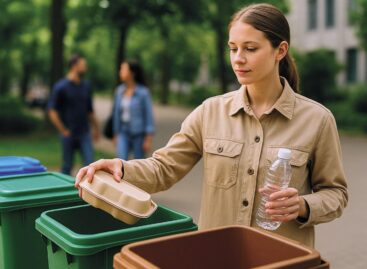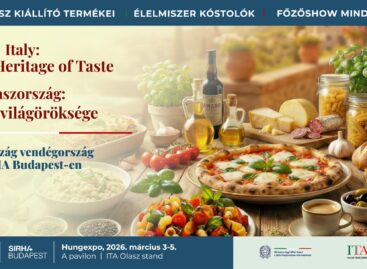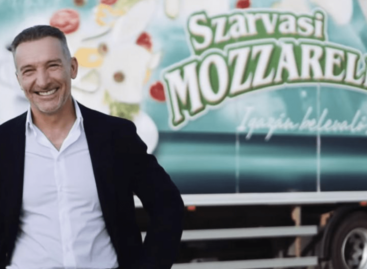BS Plastic: Sustainable innovations lead in the plastics industry
BS Plastic Kft. started in 2002 as a small family business, mainly trading in promotional bags and packaging materials, and has grown to become a firm with a production capacity of 6,000 tonnes that employs around 100 people. The company’s main profile is the production of polyethylene-based (flexible) packaging materials, flat films, tubes, shrink films, bags and promotional bags.
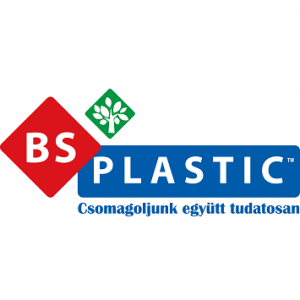

László Büki, BS Plastic’s founder
and honorary president of
the Association for Sustainable Packaging
“Our customers include multinational companies, food manufacturers/processors, supermarket chains and numerous small and medium-sized enterprises in Hungary and abroad. Being a plastics company, we place emphasis on sustainability and environmental protection, so we started manufacturing environmentally friendly corn starch and PLA-based degradable, compostable products as early as 2012”,
says László Büki, owner of BS Plastic and honorary president of the Association for Sustainable Packaging.
In 2019 BS Plastic was among the first in the domestic market to obtain the TÜV AUSTRIA OK compost INDUSTRIAL and OK compost HOME certifications. The company operates under the ISO 9001:2015 quality management system and since 2017 it has also had the BRCGS Packaging certification (this is a high level food safety and hygiene system).
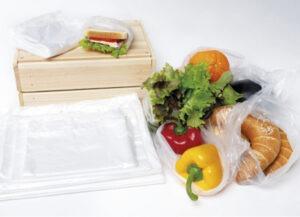
High standards of hygiene and product protection are the most important requirements for food packaging
Plastic isn’t our enemy!
In recent years the packaging industry has undergone significant changes, just like other industries. Sustainability and the circular economy are increasingly important. In Hungary one of the barriers for a sustainable plastics industry is the lack of controlling bodies, even if the domestic legislation is clear. In 2021 two acts affecting plastics entered into force: the Waste Act (Act II of 2021) and the provision on the ban on single-use plastics (Act 301/2021). Still, uncertified, counterfeit, non-biodegradable or partially biodegradable products called “bio-bags” have appeared in the market, not only deceiving consumers and giving a bad name to truly biodegradable materials, but also damaging the state budget and putting honest companies at a competitive disadvantage.
.
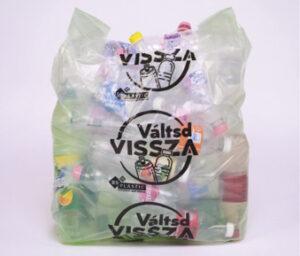
Packaging materials shall be used responsibly and then recycled
László Büki believes that simply replacing conventional plastics with biodegradable ones won’t solve the problem. “Conventional plastics aren’t our enemy, they just need to be used, applied and managed responsibly at the end of their life cycle. It doesn’t always make sense to replace them and we also need to look at the function of the packaging material being substituted, in order to see whether it meets the necessary criteria, e.g. for shelf life”, says the owner of BS Plastic Kft.
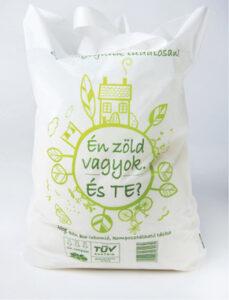
Organic flap tie trash bags are the perfect alternative to their traditional counterparts, they are reusable and recyclable or compostable
Shared goals for a greener future
It was on the basis of these ideas that the Association for Sustainable Packaging (FECSO) was established in February 2024, as a trade organisation working for a mutually beneficial alliance between scientists, manufacturers and business users, with shared economic and social goals.
“We wish to help packaging users, food companies and retail chains in developing sustainable and environmentally friendly packaging. Our objective is to educate, communicate collectively, establish a certification system, present good practices, provide correct and credible information, communicate actual facts and do away with misconceptions”,
explains honorary president László Büki. One of the main tasks of the association is to overcome business difficulties by providing a precise definition of biodegradable, compostable plastic through the application of standards. Tasks related to sustainable packaging also include monitoring and compliance with EU regulations and directives. In the future we should focus on recycling-oriented packaging design, which would achieve the highest level of product protection while keeping materials in the cycle to the maximum. (x)
Related news
Packaging market sitting on a roundabout
🎧 Hallgasd a cikket: Lejátszás Szünet Folytatás Leállítás Nyelv: Auto…
Read more >“The reverse vending machine system is 20th century technology in the 21st century”
🎧 Hallgasd a cikket: Lejátszás Szünet Folytatás Leállítás Nyelv: Auto…
Read more >Schwarz Group to Significantly Reduce Virgin Plastic Use by 2030
🎧 Hallgasd a cikket: Lejátszás Szünet Folytatás Leállítás Nyelv: Auto…
Read more >Related news
Italy is the guest country at the SIRHA Budapest 2026 trade fair
🎧 Hallgasd a cikket: Lejátszás Szünet Folytatás Leállítás Nyelv: Auto…
Read more >Renewal at Szarvasi Mozzarella – the company’s commercial activities have been strengthened under the leadership of Máté Besenczy
🎧 Hallgasd a cikket: Lejátszás Szünet Folytatás Leállítás Nyelv: Auto…
Read more >Lidl Magyarország wins Top Employer award once again
🎧 Hallgasd a cikket: Lejátszás Szünet Folytatás Leállítás Nyelv: Auto…
Read more >


